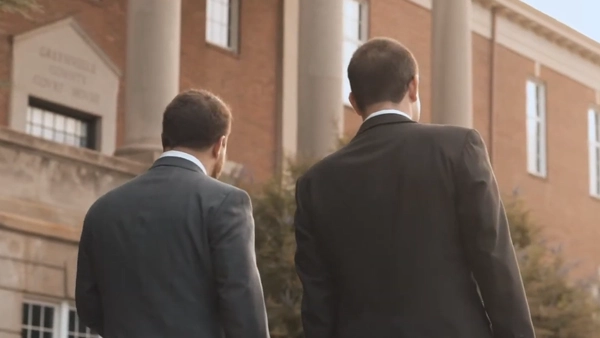An out-of-court settlement allows the injured person and the responsible party (typically through their insurance company) to negotiate a resolution without the need for a judge or jury.
This option is appealing because it can shorten the time frame for the injured party receiving compensation, reduce the stress of lengthy court proceedings, and offer greater control over the outcome of your case.
But just because a settlement can be quicker and less stressful, it doesn’t always mean it’s easy to obtain a settlement that is fair.
Insurance companies often aim to protect their profits by offering injured parties a quick but unfairly low settlement amount. Without guidance from an experienced personal injury attorney, you may unknowingly accept a settlement far below what your injuries truly warrant.
At David R. Price, Jr., P.A., we believe you deserve more than just a quick check from an insurance company. You deserve a fair resolution that truly reflects your pain, lost time, and future needs. That’s why we approach every case with one goal in mind: to make sure you’re treated fairly and compensated fully, whether that happens through a strong settlement or by going to trial.
When Might an Out-of-Court Settlement Occur?
The liable party might make a settlement offer before the plaintiff has filed a lawsuit, but after the personal injury claim arises. Alternatively, the responsible party might make an offer after a lawsuit has been filed, or during the trial, but before getting the final verdict.
Typically, once the out-of-court settlement has been reached, the plaintiff relinquishes all claims against the liable party stemming from the incident or accident that the personal injury claim is based upon, in exchange for the agreed-upon payment.
For instance, the insurance provider of a negligent driver might offer a settlement of $64,000 to the plaintiff in an auto accident claim. To receive the $64,000 settlement, the plaintiff would be required to sign a document agreeing that they wouldn’t file a lawsuit against the driver or pursue other legal remedies in connection with the auto accident.
Why Do So Many Personal Injury Cases Settle?
Settlements are a common outcome in personal injury cases for several reasons:
Cost-Effectiveness
Going to trial can be expensive. Legal fees, court costs, expert witness fees, and other expenses can quickly add up. Both parties may decide that settling the case can be a more cost-effective option.
Time Savings
Trials can be lengthy, often taking months or even years to conclude. Settlements can be negotiated and completed in a much shorter time frame. This is advantageous for the injured party, who might need financial compensation sooner to manage medical bills and other expenses related to their injury.
Risk Management
Trials are unpredictable. Even with strong evidence, the outcome can never be guaranteed. Settlements allow both parties to have more control over the outcome, managing the risk of an unfavorable or unexpected verdict.
Certainty and Control
Settlements provide a definite outcome. When parties choose to settle, they negotiate mutually agreeable terms, offering a certain result that can be planned around, as opposed to the uncertainty that comes with a jury decision.
Privacy
Court proceedings and the associated documents are typically public. Settlements can be kept confidential, protecting the privacy of all involved parties. This is often best in sensitive situations or where privacy is a priority for the parties involved.
Is Settling Always the Right Choice?
Settling a personal injury claim out of court isn’t always the right move, but it can be the best choice in many situations.
It’s important to consider the reliability of the settlement offer itself. Insurance companies often aim to settle quickly and for as little as possible, protecting their financial interests. It’s crucial, therefore, to approach settlement offers with a strategic mindset, as accepting a poor settlement offer could leave you without essential resources for future recovery and expenses.
It is equally important not to accept a settlement offer too soon, before you are healed from your injuries. Until you can fully calculate your medical expenses and lost wages, and determine whether you have fully recovered from your injuries, you cannot adequately value your case.
Settling can be advantageous when done under the right circumstances. It offers a quicker resolution, allowing you to avoid the uncertainties and emotional strain of a trial. Yet, it requires a keen understanding of your case’s worth, something our personal injury lawyers understand and can help you determine.
We recommend working with skilled legal counsel who can assess the strength of your case, negotiate on your behalf, and help you understand whether the settlement offer adequately compensates for your losses.
What Does the Settlement Process Look Like?
Every personal injury case is different, but when it comes to reaching an out-of-court settlement, there’s a general path that most of our cases follow.
1. Initial Consultation & Case Evaluation
First, we listen to your story. We want to understand exactly what happened, how it’s affected your life, and what you need to move forward. We’ll review any documents you already have and start mapping out your options.
2. Investigation & Evidence Gathering
Once we’ve taken on your case, we gather medical records, accident reports, photographs, witness statements, and anything else that helps paint a full picture of your injuries and the other party’s liability for what happened. We may consult experts like doctors or accident reconstructionists to strengthen your claim.
3. Medical Treatment & Documentation
It’s important that you follow your doctor’s advice and complete your treatment or reach what’s called maximum medical improvement, the point where your condition is stable. This ensures that you can understand the full extent of your injuries, including any future care or limitations you may face.
4. Sending a Demand Letter
Once we have a strong case file and a clear understanding of your damages, we draft and send a demand letter to the insurance company. This letter outlines what happened, explains why the other party is at fault, and requests a specific amount in compensation based on your medical bills, lost wages, pain and suffering, and more.
5. Negotiations Begin
After the insurance company reviews our demand, they’ll usually respond with a counteroffer. From there, we enter a negotiation phase. Sometimes it’s straightforward. Other times, it’s a bit of a battle. We’ll push for what’s fair and keep you in the loop the entire way.
6. Settlement Reached (or Not)
If we’re able to reach an agreement that truly reflects the value of your case, we’ll finalize the terms, and you’ll receive your settlement. If the insurance company refuses to offer a fair amount, then we will file a lawsuit and take the case to trial. We prepare every case as if it might go to court. That way, we’re always negotiating from a position of strength.
Talk to a Skilled Personal Injury Lawyer in Greenville
If you are thinking of filing a personal injury claim after getting hurt in an accident because of someone else’s negligent acts, then don’t hesitate to get in touch with a lawyer at David R. Price Jr., P.A.
Our personal injury lawyers in Greenville can help you understand more about your claim, your rights to compensation, and the best legal options for your case. You can schedule a free case evaluation by calling 864-271-2636 or filling out our online form.
Personal Injury FAQ
+ What’s included in a personal injury settlement?
A personal injury settlement includes compensation for a claimant’s damages or losses, including medical bills, lost earnings, and compensation for pain and suffering, mental anguish, loss of enjoyment of life, and other general damages.
+ Can I negotiate a settlement without a lawyer?
You can, but you may not be fully aware of your rights and obligations. For that reason, consider discussing your personal injury claim with a lawyer during a free consultation to determine whether you should take on settlement negotiations on your own.
+ What is a personal injury lawsuit?
A personal injury lawsuit occurs when an injured victim initiates legal action against another individual or entity (like a product manufacturer, government agency, company, hospital, etc.) to recover damages incurred by the victim. The lawsuit is the legal mechanism that results in a court trial, through which a judge or jury determines how much damages are owed to the victim.







